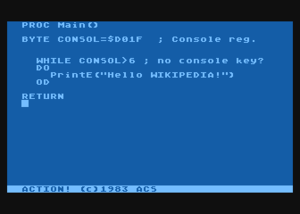Action! (programming language)
|
Action! editor | |
| Original author(s) | Clinton Parker |
|---|---|
| Developer(s) | Optimized Systems Software |
| Discontinued | v3.6 / 1983 |
| Platform | Atari 8-bit family |
| Size | 16K bank-switched cartridge |
Action! is a programming language and development environment with an integrated editor, debugger, and 6502 compiler for the Atari 8-bit family of microcomputers. It was created by Clinton Parker and released on cartridge by Optimized Systems Software in 1983. The language's syntax is similar to that of ALGOL 68.
Action! language constructs were designed to map cleanly to 6502 opcodes, so it provides the high performance necessary for game and graphics demos without needing complex optimizations in the compiler.
A development library was available as a separate product called the Action! Toolkit. Action! source code listings for games were common in ANALOG Computing, and Action! was used to develop at least two commercial products: the Homepak productivity suite and Games Computers Play client program. The language was never ported to other systems.
The 6502 assembly language source code for Action! was made available under the GNU General Public License by the author in 2015.
Data Types
Action! has three fundamental data types, all of which are numeric.
BYTE
Internally represented as an unsigned 8-bit integer. Values range from 0 to 255.
The CHAR keyword can also be used to declare BYTE variables.
BYTE age=[21] ; declare age and initialize it to the value 21 BYTE leftMargin=82 ; declare leftMargin and store it at address 82
CARDinal
Internally represented as an unsigned 16-bit integer. Values range from 0 to 65,535.
CARD population=$600 ; declare population and store it at address 1536 and 1537 CARD prevYear, curYear, nextYear ; use commas to declare multiple variables
INTeger
Internally represented as a signed 16-bit integer. Values range from -32,768 to 32,767.
INT veryCold = [-10]
INT profitsQ1, profitsQ2, ; declaring multiple variables can
profitsQ3, profitsQ4 ; span across multiple lines
Action! also has ARRAYs, POINTERs and user-defined TYPEs. No floating point support was provided.
An example of a user-defined TYPE:
TYPE CORD=[CARD x,y] CORD point point.x=42 point.y=23
Keywords
A "keyword" is any word or symbol that the ACTION! compiler recognizes as something special. It can be an operator, a data type name, a statement, or a compiler directive.
AND FI OR UNTIL = ( ARRAY FOR POINTER WHILE <> ) BYTE FUNC PROC XOR # . CARD IF RETURN + > [ CHAR INCLUDE RSH - >= ] DEFINE INT SET * < " DO LSH STEP / <= ' ELSE MOD THEN & $ ; ELSEIF MODULE TO % ^ EXIT OD TYPE ! @
Programming
Programming in Action! requires working with the editor and compiling/debugging in the monitor. The editor features a full-screen, scrolling display capable of displaying two windows. The editor also includes block operations and global search and replace. Compiling takes place in the monitor, a mode that allows compiling and debugging.
Action! is a one-pass compiler, which compiles the source code entirely in memory or from a file.[1] This allows great speed, but limits the amount of code that may be compiled.
Local variables are assigned fixed addresses in memory, instead of being allocated on the stack. This enables tight code to be generated for the 6502, but precludes the use of recursion.
Example code
The following is example code for Sieve of Eratosthenes written in Action!. In order to increase performance, it disables the ANTIC graphics co-processor, preventing its DMA engine from "stealing" CPU cycles during computation.
BYTE RTCLOK=20, ; addr of sys timer
SDMCTL=559 ; DMA control
BYTE ARRAY FLAGS(8190)
CARD COUNT,I,K,PRIME,TIME
PROC SIEVE()
SDMCTL=0 ; shut off Antic
RTCLOK=0 ; only one timer needed
COUNT=0 ; init count
FOR I=0 TO 8190 ; and flags
DO
FLAGS(I)='T ; "'T" is a compiler-provided constant for True
OD
FOR I=0 TO 8190 ; and flags
DO
IF FLAGS(I)='T THEN
PRIME=I+I+3
K=I+PRIME
WHILE K<=8190
DO
FLAGS(K)='F ; "'F" is a compiler-provided constant for False
K==+PRIME
OD
COUNT==+1
FI
OD
TIME=RTCLOK ; get timer reading
SDMCTL=34 ; restore screen
PRINTF("%E %U PRIMES IN",COUNT)
PRINTF("%E %U JIFFIES",TIME)
RETURN
